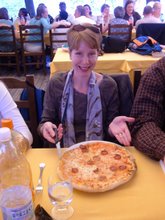I ventured out in an arctic blast last night to attend a yoga class that will count as a requirement toward my eventual certification as a yoga instructor. When I arrived for class, I discovered that the instructor I hoped to observe was detained by work. Swallowing my disappointment, I spread my mat and met his substitute, a lovely woman who welcomed me and asked if I’m a regular in the class. I introduced myself, sat down, and waited for class to start.
The woman next to me overheard our conversation and quietly asked, “What did you say your name is?”
“Crystal,” I answered.
“Do you know who I am?” she asked.
She looked familiar. But I’ve moved around a lot and I'm always meeting people who remind me of someone I once knew. I began sorting through a mental database of friends and co-workers. There was a flash of recognition, but I couldn’t wrap my mind around the possibility of it. “I’m Brenda,” she said. In just a heartbeat, I felt as if the doors of my life were flung wide open and I could see down a long corridor that led right back to the start.
Who is Brenda and why does she matter to me? Let me count the ways: 1) I might be a college dropout today if it weren't for Brenda. 2) She loaned me a bed from her guest room when I moved into my first apartment with nothing more than clothes and a few pieces of silverware. 3) She opened a window on a world so vast that I began to trust life might hold more possibility than my 19-year-old imagination could fathom.
Brenda was responsible for guiding me toward a major when I had no idea what to do with my life. As a confused college sophomore, I had briefly considered dropping out of school. At the time, all I could see was the money my parents were wasting while I muddled through, trying to figure out who I was and what I could be. She was just a few years older than I, but Brenda was legions wiser and she used that wisdom to mentor me, convincing me that I could write. She showed me how I could make a living at that.
Brenda was responsible for helping me get a job as an undergraduate assistant when I had no qualifications or skills. How could she see any potential in someone who was so incompetent and naïve? Where did she find the patience to train me? The money I earned provided pocket change when tuition, books, and room and board were semester by semester miracles for my middle-class family.
During my sophomore year, she used her influence as a graduate assistant to send me and another student to a speech contest in Laguna Beach, California. Accompanied by Brenda, Dennis and I saw the Pacific Ocean, tasted really good coffee and dined on fine cuisine, all for the first time. Before that trip, neither Dennis nor I had ever ventured beyond our small-town, mid-western existence. He was demonstrably unimpressed by California. To me, the trip was far more than a speech competition. It was a breathtaking window on a world full of promise.
After last night’s class, Brenda invited me to join her and a group of her yoga buddies for dinner. It’s been almost three decades since I lost track of her, but I have never forgotten her wit, sense of humor, wisdom, and kindness, all of which are still very much in tact.
She was there last night only because her friend was the class substitute teacher. I was there only because my husband was out of town and I thought it was a good opportunity to catch a class. The gift of our reunion last night was no fluke. It was an affirmation that we can never know how much our life may matter to another person.
Here was the divine lunar lesson delivered for my edification and yours:
- When someone in your life is confused, share your wisdom.
- When someone in your life has lost faith in self, believe in them.
- When someone in your life will benefit from it, use your influence.
- When someone in your life has need, share your resources and material possessions.
- And finally, when you have the chance, be totally grateful for all the people in your life who have bestowed those things on you.









